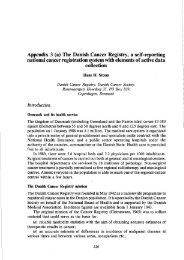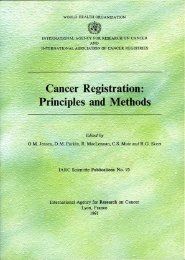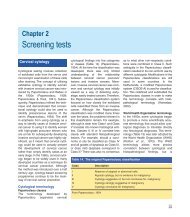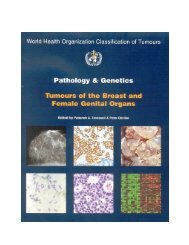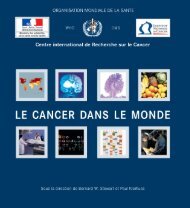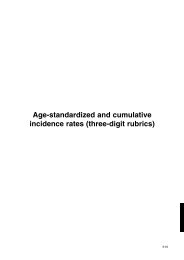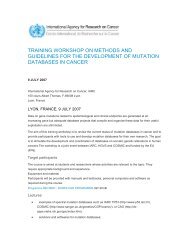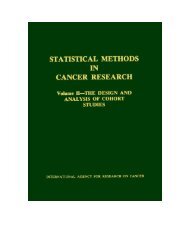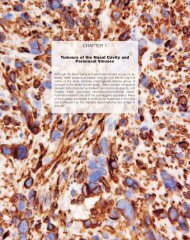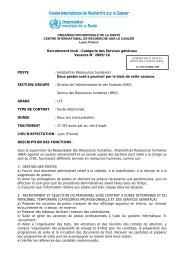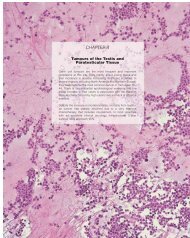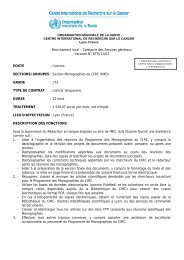world cancer report - iarc
world cancer report - iarc
world cancer report - iarc
Create successful ePaper yourself
Turn your PDF publications into a flip-book with our unique Google optimized e-Paper software.
dietary-related <strong>cancer</strong>s considered attributable<br />
to food additives is very low [13].<br />
Micronutrients<br />
Research on vitamins and <strong>cancer</strong> in<br />
humans has focused mainly on<br />
carotenoids and vitamin A (retinol), vitamin<br />
E, vitamin C and some of the group of<br />
B vitamins (folic acid, B 6). The biological<br />
basis of the interest in these vitamins is<br />
their involvement in either of two metabolic<br />
mechanisms commonly called the<br />
antioxidant effect (carotenoids, vitamins C<br />
and E) and methyl donation (folic acid, B 6)<br />
(Chemoprevention, p151).<br />
case-control studies based on dietary<br />
questionnaires and several small prospective<br />
cohort studies based on blood measurements<br />
have shown quite consistently<br />
that individuals with lower carotenoid levels<br />
have increased lung <strong>cancer</strong> risk. Less<br />
consistent and weaker protective effects<br />
of carotenoids have also been <strong>report</strong>ed for<br />
<strong>cancer</strong>s of the oesophagus, stomach,<br />
colorectum, breast and cervix. Low<br />
dietary intake of vitamin C has been found<br />
to be associated with increased risk of<br />
<strong>cancer</strong>s of the stomach, mouth, pharynx,<br />
oesophagus and, less consistently, with<br />
<strong>cancer</strong>s of the lung, pancreas and cervix.<br />
Although results on vitamin E and <strong>cancer</strong><br />
are less strong and consistent than those<br />
on carotenoids and vitamin C, several<br />
PATTERNS OF RED MEAT CONSUMPTION<br />
A<br />
< 11.1<br />
< 21.1 < 31.2<br />
g/day<br />
< 41.3<br />
studies have suggested that low vitamin E<br />
intake is related to increased risk of <strong>cancer</strong>s<br />
of the lung, cervix and colorectum.<br />
Studies to investigate the effect of dietary<br />
supplementation with vitamins on <strong>cancer</strong><br />
risk have had varying results (Chemoprevention,<br />
p151). Two large studies, ATBC<br />
and CARET [14], observed increases in<br />
lung <strong>cancer</strong> incidence of 18% and 28%<br />
respectively in the group receiving βcarotene<br />
(β-carotene plus vitamin A in<br />
CARET). In the ATBC study, the group<br />
receiving a vitamin E supplement had a<br />
34% reduction in prostate <strong>cancer</strong> incidence,<br />
but deaths from cerebrovascular<br />
accidents doubled and there was no<br />
decrease in total mortality.<br />
There is rising interest in the possible <strong>cancer</strong>-preventive<br />
effect of folic acid; some<br />
prospective studies have shown that high<br />
dietary intakes and higher blood levels may<br />
be associated with reduced risk of <strong>cancer</strong>s<br />
and adenomatous polyps of the colorectum.<br />
Folates and vitamin B 6 are involved in<br />
the synthesis of methionine and choline as<br />
methyl donors. Folate deficiency leads to<br />
an accumulation of homocysteine. High<br />
homocysteine levels have recently been<br />
found to be strongly associated with death<br />
from myocardial infarction, total mortality<br />
and colon <strong>cancer</strong> risk [15].<br />
Epidemiological studies conducted in<br />
populations with a high incidence of<br />
< 51.3<br />
Relative risk<br />
Fish<br />
Poultry<br />
Processed meat<br />
Red meat<br />
Meat<br />
INCIDENCE OF COLORECTAL CANCER IN MEN<br />
0.6 0.8 1.0 1.2 1.4 1.6 1.8<br />
Cohort study<br />
All studies<br />
case-control study<br />
Fig. 2.57 Influence of the consumption of fish and<br />
different types of meat on the relative risk of<br />
developing colorectal <strong>cancer</strong> [7].<br />
oesophageal <strong>cancer</strong> in China found that<br />
zinc deficiency was common in these populations.<br />
Some experimental studies also<br />
suggest that selenium deficiency may<br />
increase <strong>cancer</strong> risk [16]. Several epidemiological<br />
studies have examined the<br />
association between <strong>cancer</strong> risk and deficiencies<br />
of one of these minerals, with<br />
very variable results.<br />
< 5.0 < 9.4 < 13.8 < 31.0 < 60.3<br />
Age-standardized rate/100,000 population<br />
Fig. 2.58 The global levels of (A) red meat consumption (beef, lamb and pork) and its relationship to (B) the incidence of colorectal <strong>cancer</strong>. The biological basis<br />
of the correlation between these two variables is complex and not yet fully understood.<br />
B<br />
Diet and nutrition<br />
65



